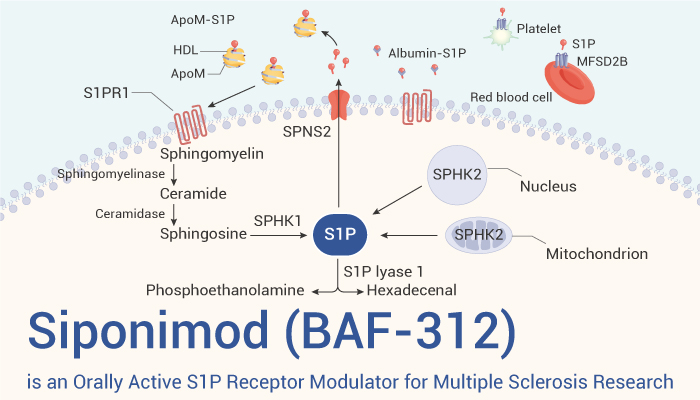Sphingosine 1-phosphate (S1P) is a bioactive lipid molecule secreted into the circulation mainly by erythrocytes and endothelial cells. First of all, S1P acts via G protein-coupled S1P receptors (S1PRs), is important for vascular integrity and lymphocyte trafficking. Secondly, the S1P-S1PR signalling axis is a key component of the inflammatory response in autoimmune rheumatic diseases. Therefore, several drugs that target S1PRs have been approved for the treatment of multiple sclerosis (MS) and inflammatory bowel disease.
Recently approved drugs, namely, Siponimod, are selective for S1PR1 and S1PR5.

Siponimod (BAF-312) is an orally active and selective S1P receptor modulator.
Siponimod is selective for S1P1 and S1P5 with EC50s of 0.4 and 0.98 nM, respectively.
First, Siponimod (compound 32) exhibits selectivity to S1P1 and S1P5, and spares activity on the S1P2, S1P3 and S1P4 receptors. Second, Siponimod (1 mM; 0-1 h) promotes internalization of S1P1 receptors, results 94% S1P1 receptors localized intracellularly at 1 h. Third, Siponimod (0.001 nM-1 μM; 1 h) activates the GIRK channel in atrial myocytes, with an EC50 value of 15.8 nM in CHO cell line CCL-61.
In vivo, Siponimod (1 g/kg; i.v.; single) shows low to moderate in monkey, but high in rat in metabolism studies with liver microsomes. In addition, the absolute bioavailability is 50 and 71% in the rat and monkey, respectively, indicating no major presystemic first pass metabolism. Finally, Siponimod (0.3, 3 mg/kg; p.o.; once daily; 23 d) suppresses experimental autoimmune encephalomyelitis (EAE) in rats by internalizing S1P1 receptors.
In a word, Siponimod (BAF-312) is an orally active and selective S1P receptor modulator for MS research.
Reference:
[1] Gergely P, et al. Br J Pharmacol. 2012 Nov;167(5):1035-47.
[2] Burg N, et al. Nat Rev Rheumatol. 2022 Jun;18(6):335-351.